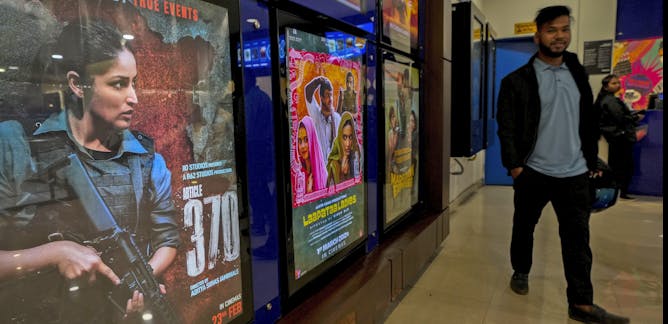
Articles on India elections
Displaying 1 - 20 of 33 articles

On today’s Don’t Call Me Resilient podcast, political scientist Sikata Banerjee and cinema studies scholar Rakesh Sengupta explain how cinema and social media in India may be helping to sway voters.

Listen to Indrajit Roy talk about hope and politics in India on The Conversation Weekly podcast.

The Indian prime minister made reference to communities that have “too many children” in a veiled reference to Muslims.

In 2024, more than 40% of the world’s population is eligible to vote in an election. The scale is unprecedented, but not all elections are made equal. What will it mean for democracy?

Indian Prime Minister Narendra Modi and opposition politicians are courting the diaspora in the run-up to next year’s elections in India. What role does the diaspora play in Indian politics?

A spatial analysis of India’s election results shows a unique geographical footprint of the BJP vote and how its recent progression follows obvious geographic patterns.

Despite branding himself India’s ‘watchman’, Modi has a mixed record when it comes to keeping India secure.

India’s re-elected Prime Minister Narendra Modi delivered a victory speech that presented himself as a selfless and humble ascetic. This vision goes far to promote a Hindu nationalist ‘new’ India.

In Narendra Modi, India has found a development messiah.

The Bharatiya Janata Party of Narendra Modi has claimed victory in the world’s biggest democratic exercise.

Narendra Modi looks poised to win the Indian election, even though India’s long-standing economic and social problems haven’t been tackled to any great extent.

Women are vastly outnumbered in India’s parliament but there are some key names to look out for.

Anti-caste and Dalit movements have emerged as a voice to count on as India’s 2019 legislative elections unfold.

CC BY-ND29.3 MB (download)
Part six of The Anthill podcast's India Tomorrow series focuses on the concerns of young Indians.

As the rich get richer in India, many voters seem willing to overlook their everyday struggles, hoping that the trickle-down effect of a “business friendly” government will help the overall economy.

India’s prime minister, Narendra Modi, rode to power in 2014 promising economic transformation.

CC BY-ND24.4 MB (download)
Part five of India Tomorrow takes a look at India’s economy.

India election 2019: millions of Indian youth are underemployed and going to the polls
The Conversation, CC BY64.4 MB (download)
The world's largest democracy will see its biggest young voter turnout since gaining independence 72 years ago, with millions delivering their verdict on Narendra Modi's BJP government.

Explaining the equipment and the process by which hundreds of millions of ballots are collected and counted in India.

CC BY-ND39.2 MB (download)
We focus on Kashmir in the third part of our India Tomorrow podcast series: its history, the lives of its people, and the conflict over its future.
